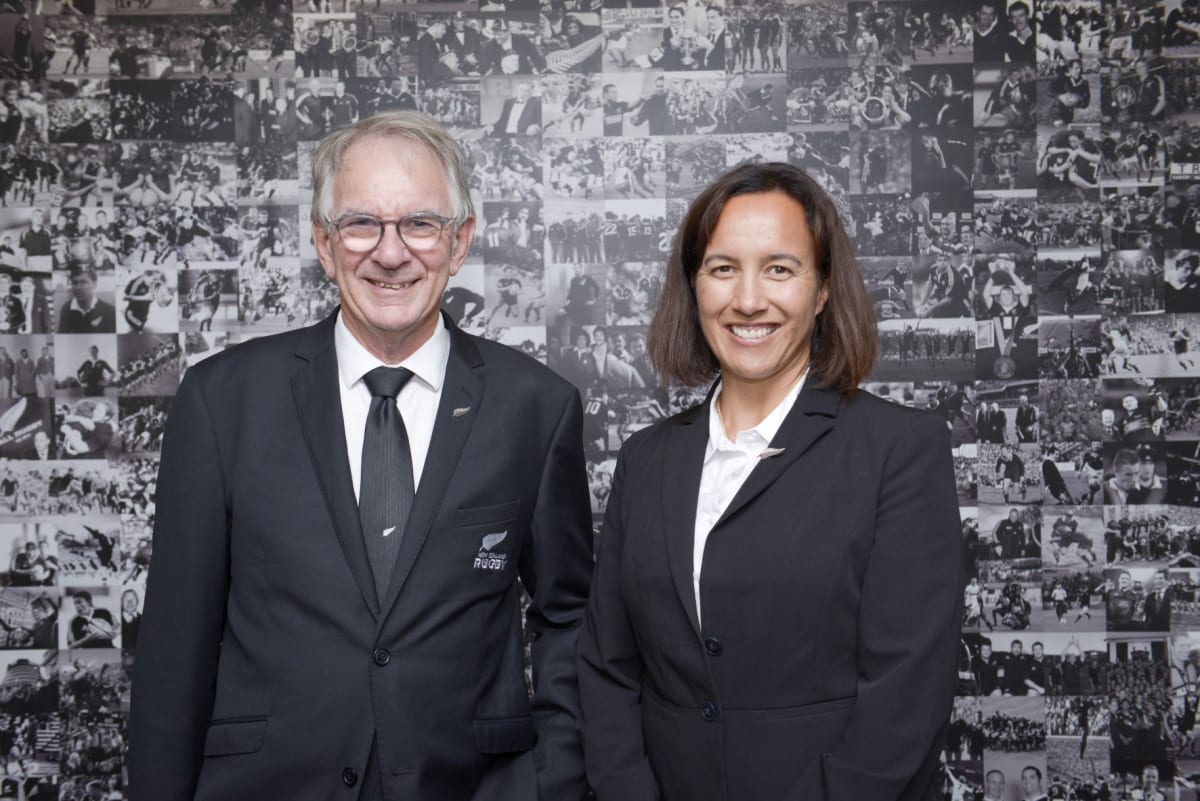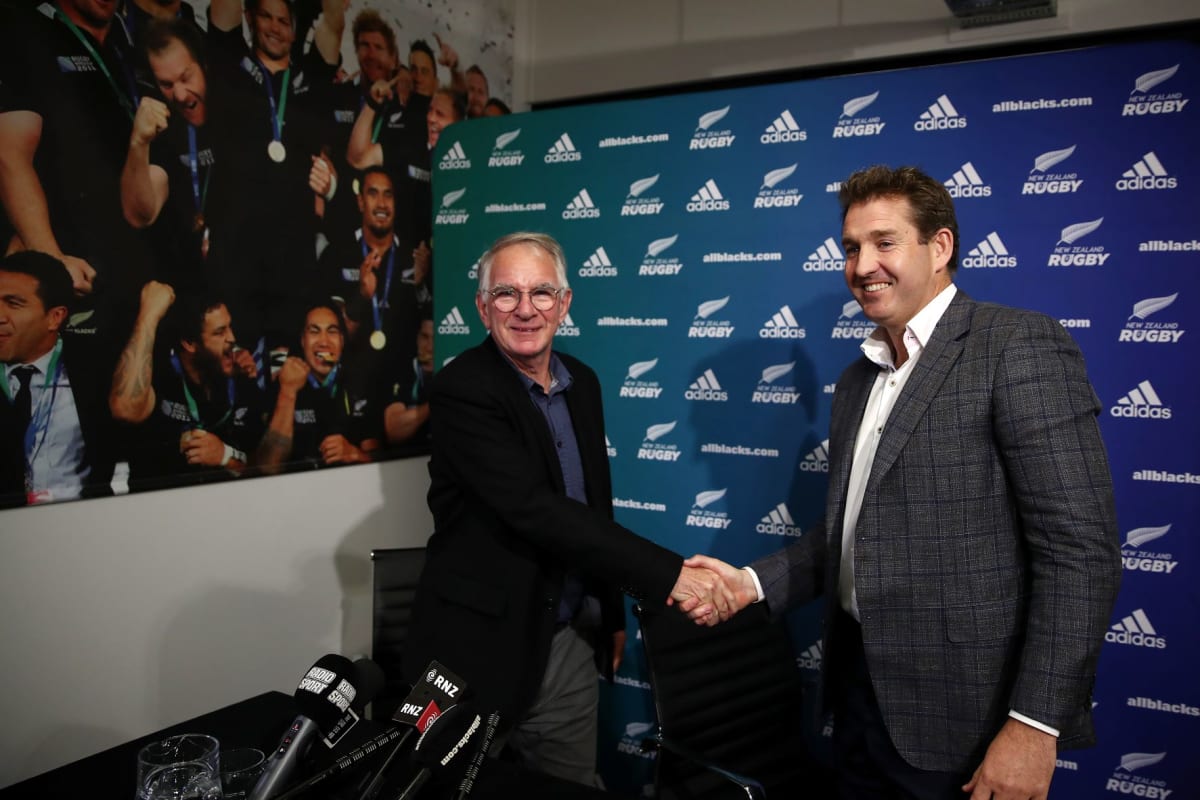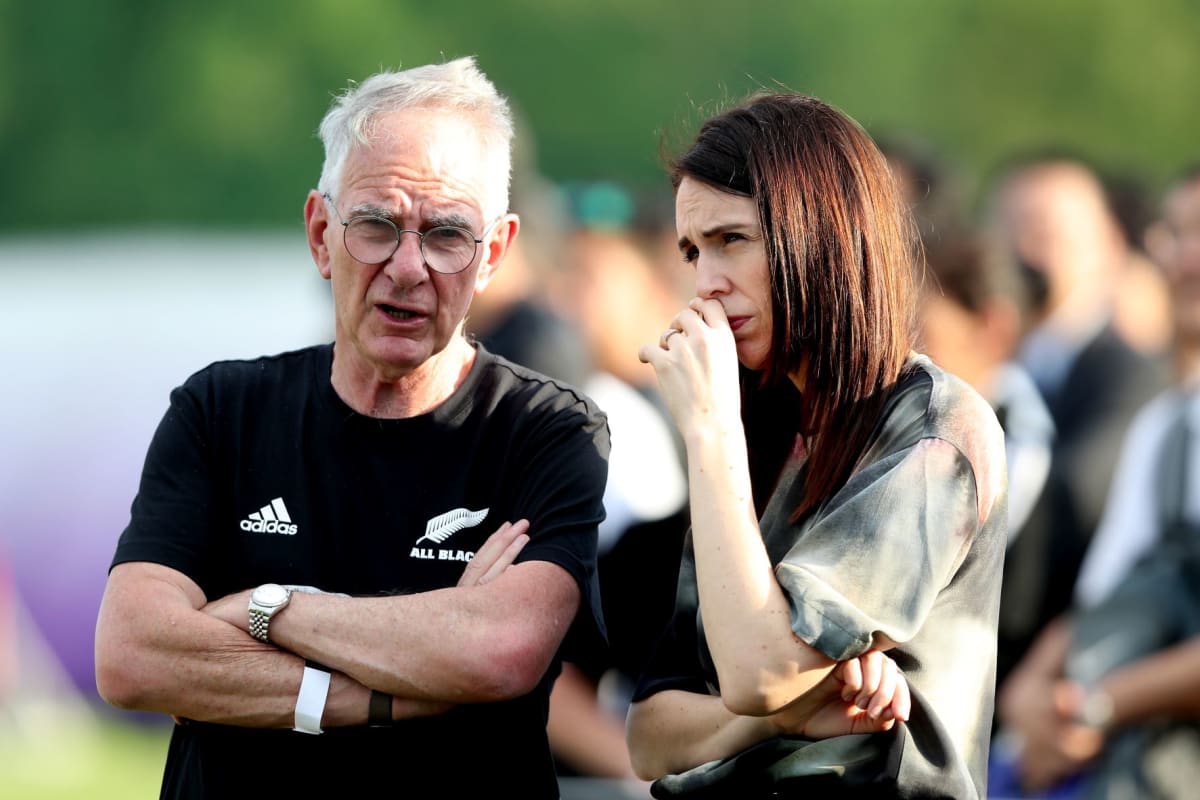
After 10 years as a director and then chair of New Zealand Rugby, Brent Impey has stepped down. His reflections on his time at the helm are typically forthright. He talks to Newsroom about the need for directors to stay in their lane, diversity quotas, Aussie egos and why Forsyth Barr is our best rugby arena.
Newsroom: What was your approach to being a director then chair of NZR?
My mantra throughout was to do whatever was needed, within the laws and spirit of the game, for New Zealand Rugby. My goal was to govern the transformation of the game at all levels, however I soon realised that to do so required significant buy in from everyone involved in the game - from All Blacks management to provincial unions from government agencies to communities, from the Rugby Players Association to clubs and schools.
The role of a director and chair of NZR is an honour and a privilege. You are there to govern the national sport. Virtually everyone has an opinion, from your local barista to the Uber driver to your friends, both old and “new”. However, this is to be cherished- as long as there is passion for the national sport, its future is strong.

How difficult is it to please everyone?
The New Zealand rugby structure is intertwined and complex. It is akin to a game of dominoes; every decision you make impacts on others. For example, permitting All Blacks sabbaticals, while essential both to retain players and for player welfare, impacts Super clubs, and onto NPC etc. Or extending by a week the NPC season impacts club finals, and pre-season Super. On and on it goes.
Did your experience as CEO of MediaWorks and other leadership roles prepare you for this?
Governance at national sport level is different from the commercial world. I have heard it said that excellent commercial directors leave their minds behind them when they enter the sports director room. My experience is that the majority have the best interests of the game at heart. There is however a tendency to oversell their achievements, again driven by the passion for the game. We all need reminding that the role is governance, not management, and that while we are the custodians of the sport, we are not executive directors. I have been fortunate in having two excellent CEOs in Steve Tew and Mark Robinson, the first tough on the outside, softer on the inside (a compliment), the second a combination of transformation and tradition (also a compliment); both exceptional operators.

Under your watch, there has been an attempt to bring more diversity to the board. Has it resulted in stronger boards?
The quality of the board has varied. It took 3 constitutional reviews to reach the point where diversity of mainly skills, ethnicity, and gender could be achieved. I believe the provincial unions have acted responsibly in bringing forward candidates they viewed as being able to add to the NZR board. We have come a long way although this is an on-going journey to do what we can to ensure we have diversity of thought around the board table, through gender, age, ethnicity and experience. We do need to be prudent around fixed quotas however - I have personally witnessed high quality men and women withdraw because diversity has overtaken skills and competence as the basis for selection. We are at risk of going overboard here.
On and off the field - do you think New Zealand Rugby has performed well enough during your tenure?
On the field achievements have been many. I repeat, the board is governance, so credit for these go to all from board to management to staff to players and contractors - the whole team. I do take pride in winning both the men’s and women’s World Cups, Black Ferns 7’s winning a World Cup, an Olympic Gold and Silver, and All Blacks 7’s a World Cup and Olympic Silver. On top of that our teams have completely dominated Super Rugby during my time, especially the Crusaders, but also the Chiefs with back-to-back titles, Highlanders, Hurricanes with one each, and Blues (Trans-Tasman).
Off the field, I reflect on some success and some failure. I originally applied to be on the board because, with a media background, I believed NZR seriously undersold itself. I was CEO at TV3 when we won the rights for the 2007 World Cup in France and led the negotiations for New Zealand broadcasters in 2011. When I joined the NZR board in 2012 our revenue was around $112m, whereas for 2022, it is forecast to be $270m. This is as a result of a combination of factors; a better understanding internally of the value of broadcasting, a skilled commercial team who have driven hard the value of the All Blacks, and the growing internationalism of our teams in black, particularly the All Blacks, in Europe, Japan and North America.
There is a view out there that there is too much focus on the All Blacks at the expense of the overall game. Do you agree with that?
No. A future concern is that NZR takes its focus off the All Blacks. I strongly believe that we need to invest more in the women’s, community and school games etc, but the All Blacks are the driver of revenue. In fact, as the shop front, they are the only truly profitable part of the rugby ecosystem. This should never be forgotten, which means that future boards and management must ensure that the All Blacks are fully resourced, while at the same time carefully investing in those other areas of the game that need it.

Do the players, and I mean the elite players, have too much power now?
The relationship with the Rugby Players Association has become a challenge. Originally the share of revenue model made sense as in the early days of professionalism there was much uncertainty. Over the first 25 years, generally the relationship has been positive, as proven by the fact that we have retained our best players by-and-large and have been able to activate commercial deals. The Silverlake transaction has strained those relationships to a point where review is required. NZR needs money to fund the community game either directly or through the provincial unions and at the same time have sufficient to retain our players in what is a competitive international player market. There needs to be substantial movement in the next couple of years or else investment in the base of the game will continue to suffer and the game will decline.
How do you assess the decisions made on Super Rugby?
The decision to exit the Super Rugby competition in 2020 when Covid hit was painful. It was clear that the competition was doomed with Covid-19 and we had to look for alternatives; this led to a total review within NZR. Super Rugby was unsustainable both off and on the field, and we had to change. This led in turn to the competition as it now is, with 12 teams, including the Fiji Drua and Moana Pasifika, which I am sure will be very successful teams in the years to come. I am proud of our efforts to get them into Super Rugby, and I am sure that jumping the hurdles will result in success. At the same time, it is critical we continue to work with South Africa and Argentina for mutual benefit.
In hindsight was the expansion of Super Rugby a failure?
Yes. The motives were right; growing the game in Japan and Argentina - the Jaguares were a success. The South African situation was complicated by demands outside the game for the Kingz to be included - that was a failure. The movement of South African players especially to Europe and Japan impacted the competition, and the criticism within New Zealand of a lack of Pacific Island representation was fair. Having said that, Super Rugby Pacific in my view will go from strength to strength in the years ahead; sure, there will be issues to resolve, but I am very optimistic.
What about Australia?
The relationship has declined under the current leadership, the emphasis being to blame NZR instead of looking for solutions within, and a need to be in the headlines. My hope is that we can move forward together. Whether it can, sits in Moore Park (ARU).
How bad has the impact of Covid been?
2020 year was very challenging. Suddenly a no rugby option saw potential revenue collapse from $200m to $60m. Very painful losing a third of our staff and massive cost reduction, which means rugby programmes as over 80 percent of expenditure is on the game. We survived, and while there was a lot of blood on the floor, we have been able to rebuild to a position now where reserves are looking good.
You have been an advocate of the Silverlake deal - are you still as enthusiastic now?
While the present proposal is more complex than the original equity deal, I believe NZR must do it. Private equity deals in Europe, and the subsequent investment coming there will overwhelm us commercially unless we can utilise Silverlake’s access to expertise, particularly in technology, such as accessing fans world-wide, and providing rugby content through our own broadcast platform. There are challenges around the present proposal in areas such as governance and potential New Zealand future investment, and further negotiation may be needed, but overall, the deal is a good one.

If you were staying on, what would you be pushing for?
Develop and invest in a second tier. In the Southern Hemisphere this means the likes of USA, Canada, Uruguay, Brazil, Chile, Samoa, Tonga, Hong Kong, Namibia, Kenya and Zimbabwe. Top 6 in Tier 2, with regional competitions in Africa, America and Asia below that. Promotion /relegation but after a few years to enable teams to develop.
Whatever we do, we must retain the centralised professional model. It is our unique point of difference. We should be open in future to a 6th New Zealand team. The Bay of Plenty Lions concept, a joint venture with China, has future merit.
Growing the women’s game is important. Super Rugby Aupiki is a start. A SANZAAR women’s competition is a must, including Canada, USA and Fiji. And the Black Ferns 7s are simply gold in every respect. So too the NPC and Heartland. We have done well in this space. Tinker at your peril.
On a more personal note – what has been most memorable game you have attended? Your favourite ground? And the players that have stood out?
In New Zealand, my favourite ground is Forsyth Barr in Dunedin. It is the right size and the atmosphere is always great. Overseas it would be Aviva in Dublin because the crowd are both excitable and respectful.
The highlight match was the 2015 RWC final against Australia; I actually screamed as Beauden Barrett showed unbelievable speed to toe ahead a Ben Smith kick and score.
There are so many players I admire, so it is tough to single any out. I greatly admire Sarah Hirini, and Victoria Subritzky-Nafatali was a star at the RWC. All Blacks that have stood out for me are the ones that, as well as being great players, have been interested in the world outside rugby- questioning and challenging the status quo. They would include Aaron Smith, Sonny Bill Williams, Richie McCaw, TJ Perenara, Brodie Retallick, Beauden Barrett, Ardie Savea, Kieran Read, Jerome Kaino and Keven Mealamu, but there are many others.
If you could change one on-field rule, what would it be?
I am not a fan of the rolling maul. I think we should shot clock it to 10 seconds or allow the mauls to be collapsed.
Final thought?
Coming from the commercial world, execution at speed is much slower in rugby, and that is an ever-present threat to progress. Looking forward, leaders in rugby must do what is in the interests of the whole game, ahead of personal agendas. And for future directors “do whatever is needed, within the laws and spirit of the game, for New Zealand rugby.







